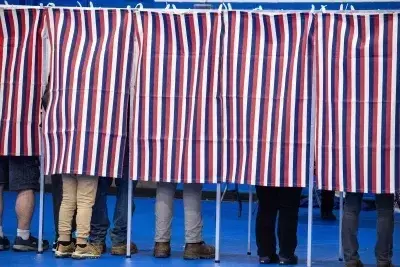
A recently developed national citizenship data system, initiated during the previous administration, has become a point of contention among several Democratic U.S. senators. The core of their apprehension revolves around the system's accuracy, its operational transparency, and the potential implications for individual privacy. This digital tool, designed to verify the citizenship status of registered voters, combines information from various federal immigration repositories with Social Security Administration records. Critics worry that such a powerful mechanism, if not properly regulated and transparently managed, could inadvertently exclude eligible citizens from exercising their voting rights, undermining the very foundation of democratic participation.
The system, an enhanced version of the existing Systematic Alien Verification for Entitlements (SAVE) platform, allows state and local election officials to cross-reference voter roll data against federal citizenship records. This marks a significant shift, enabling checks not only for naturalized foreign-born citizens but, for the first time, for U.S.-born citizens as well. The Department of Homeland Security (DHS) asserts that this upgrade aims to streamline the process of ensuring only eligible citizens participate in elections. However, the rapid deployment of this tool without the customary public notices or comprehensive documentation, typically mandated by federal privacy statutes, has drawn sharp criticism.
On July 16, 2025, Senators Alex Padilla, Gary Peters, and Jeff Merkley formally addressed Secretary Kristi Noem of the Department of Homeland Security, articulating their deep concerns. Their letter emphasized the critical need for public transparency and robust safeguards to protect citizens' rights. They highlighted the absence of routine public documentation concerning the program's functionalities and protective measures, noting a stark contrast with the administration's alleged private briefings to groups like the Election Integrity Network, an organization known for promoting unsubstantiated claims of election fraud. This perceived asymmetry in information sharing further fueled the senators' demands for accountability.
The senators' inquiry specifically requested details on the public notification process prior to the system's launch, the methodologies used to test its accuracy, the protocols in place for safeguarding personal data, and whether voter roll data would be permanently retained by the federal agency. Their concerns are amplified by the broader context of the Trump administration's unprecedented efforts to consolidate and link government datasets on American citizens, raising questions about the potential misuse of such centralized voter information. The political backdrop, marked by assertions from former President Trump and his allies about widespread non-citizen voting—claims largely unsupported by evidence—adds another layer of complexity to this debate. While Republicans advocate for more rigorous verification steps, civil rights advocates and some lawmakers fear that overly aggressive measures could suppress legitimate votes.
The ongoing dialogue underscores a fundamental tension between perceived election security and the protection of voter access and privacy. As the system continues to be implemented, the calls for transparency, accuracy, and robust oversight from legislative bodies will likely intensify, seeking to strike a balance that upholds democratic principles without disenfranchising any eligible voter.
